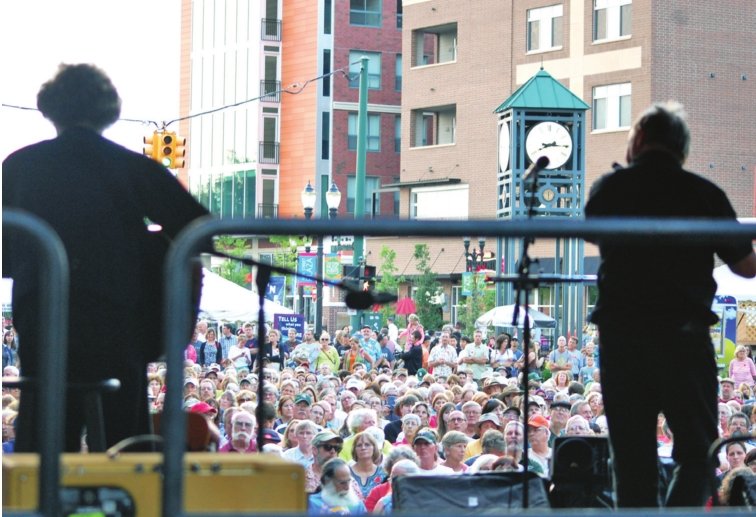
Too old and too white. Those are major reasons the Great Lakes Folk Festival won’t return to East Lansing next year.
“The main demographic for the festival is older, white and middle class,” said Mark Auslander, director of the MSU Museum, which has coordinated the event since 2002. “We can, I think, do better. We have diverse kinds of performance groups, but nowhere near the kind of diversity that reflects what greater Lansing has.”
It’s not out of step for Auslander. When City Pulse profiled the newly arrived museum director last year, he said museums should challenge themselves to “tear down walls” socially. Auslander was tasked in the late ‘90s to broaden the demographic of the Smithsonian’s Africa exhibit, which — before his adjustments — was criticized for feeling too voyeuristic and attracting few black visitors.
“We’re reimaging the planning process so that historically excluded voices are centrally involved in this. It’s going to be fantastic, otherwise, it’s just the same old thing over and over again,” Auslander explained. “I don’t think any of us want to be reproducing the same festival that existed in 2003. Art is like a shark, if it doesn’t go forward it sinks.”
Though a revamped version will appear in 2019, the Great Lakes name, according to the co-founder and longtime festival director, Marsha MacDowell, is likely to be retired for good. MacDowell said the museum’s new vision under Auslander will probably see an entirely different event rise from her festival’s ashes.
Under her direction, MacDowell said the festival had been working hard to diversify its target audience — one of Auslander’s key points of contention.
MacDowell offered several examples, such as sending fliers to black church bulletins, printing festival literature in several languages and providing festival information to regional Native American pow-wows.
MacDowell also cited the help she had promoting the festival from WKAR’s Spanish language radio host, El Chayo Cervantes, in hopes of reaching beyond a white audience.
But MacDowell wasn’t too quick to jump onboard with Auslander’s assessment that the festival was suffering from a lack of diversity. What Auslander hopes for, according to MacDowell, might prove more difficult than he imagines.
“It’s hard to do. We’ve had studies done that gathered information that showed the demographics of the festival reflected the population of Lansing,” MacDowell said. “Cultural organizations in general can struggle to attract what’s outside of their demographic.”
“If you look at past groups that have been onstage, they are not all old and they are not all white. The question is, ‘How do you draw those communities in?’” said Ten Pound Fiddle booking manager Sally Potter.
Potter argues that the suddenness of the announcement and the bad taste left in the mouths of many, may harm Auslander’s ability to retain community support through the reconfiguration process.
“The irony is you need community members to help you. If you’re gonna pull the rug out from under your community, you might not get any help when you need them,” Potter continued.
While MacDowell and the greater Lansing folk music community worry the yearlong delay will crush public interest in future events, Auslander sees it as the only effective option. He believes that only taking a few months to reconfigure the festival would result in changes that are simply “tacked on.”
“The problem is, when a group of well-meaning, privileged white people get together and say, ‘We’re going to add on a little bit of underrepresented folks,’ that is not a serious solution,” Auslander said. “A serious solution is saying, ‘We’re all going to learn together and the white folks involved are going to critically examine their own white privilege and class privilege.’” Auslander detailed the process of his solution as one where the board of organizers closely consults and integrates a group comprising diverse ethnic and economic backgrounds.
“Sure, the easy thing is to keep doing the same thing with just a little bit of addition,” Auslander said. “But, if we’re serious about transformation, if we’re really going to change the nature of the cultural conversation, sometimes you have to slow things down to bring everybody together and move things forward.”
But Auslander and the MSU Museum aren’t looking toward retooling the festival on their own. Auslander is pushing for stronger collaboration between the museum and the city, in an effort to create a “mixed form of governance.” Auslander said this entails discussions between the city, artists and the public about what can “push the envelope” and what needs to “absolutely stay and be repeated.”
“Everyone is worried that there isn’t going to be traditional music. In fact, we expect there’s going to be a lot of folk and traditional music in the months ahead. Part of the planning process is creating jam sessions and juxtapositions of different performing artists,” Auslander said. “So we need music throughout the whole process. I think people will ultimately be pleased and excited with the results.”
Support City Pulse - Donate Today!
Comments
No comments on this item Please log in to comment by clicking here